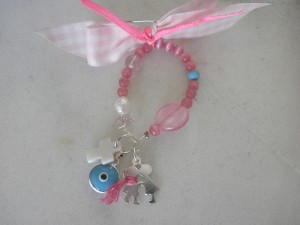When a baby is born Posted by Ourania on Jul 22, 2013 in Culture
Greek culture is rich in traditions, customs and superstitions about newborn babies. They have their roots in paganism and in Christian religion. Some of them are still followed, depending on people’s religious beliefs, social class, education, and origin.
Before the birth
- The baby’s gender was predicted by the shape of the pregnant woman’s belly: if the belly was rather “edged”, the baby would be a boy. (Αγόρι, agori, boy / κορίτσι, koritsi, girl).
- In the past, boys were preferred to girls because people needed extra hands to work in the fields, but also because boys would continue the family name.
After the birth
- In the past, it was believed that the new mother was the source of jealousy and must avoid the “evil eye” (κακό μάτι, kako mati) Therefore, she was never seen in public for forty days. After this period, she would take her baby to the church, the baby was blessed by the priest, and they could both start going out.
- On the eighth day after the birth, the Fates (Μοίρες, mires) visit the newborn and determine their future. This belief had its roots in Greek mythology.
- The baby’s clothes were never washed and air-dried at night because they would attract the bad spirits. I know it’s creepy, but it’s just a superstition.
- Before Christening, the baby’s hair was never cut. (Βάπτιση, vaptisi, baptism). This tradition is still followed by the parents who want to have their baby baptized. The baby is also never called by his or her name before the baptism.
- The name of the baby is still a big issue. Even nowadays, most babies are named after their grand-parents. If the first baby is a boy, he gets the name of his grandfather’s from his father’s side.
- Although breastfeeding is not a taboo, most Greek women avoid to do that in public because people feel uncomfortable. (Θηλάζω, thilazo, to breastfeed. / Ο θηλασμός, o thilasmos, breastfeeding.)
Presents for newborns
- Something gold: Usually, it’s a lucky charm to protect the baby from being jinxed by the “evil eye”, or a jewelry. This tradition has its roots in Christian religion because gold was one of the presents that Jesus got from the Three Wizard Kings.
- Some elderly people, when visiting a baby for the first time, put money under the pillow. Although their intentions are good, this gesture is not always appreciated by parents because of hygiene reasons.
- Some of the most common presents are clothes, blankets and sheets, towels and teddies. Sometimes, moms get practical presents too, such as bottle warmers, breast pumps, fertilizers or even prams and infant car sits.
Useful expressions
- To the parents:
- Informal: Να σου ζήσει! (na sou zisei ). The meaning of this wish is “may the baby have a good life.”
- Formal: Να σας ζήσει! (na sas zisei).
- To the grandparents:
- Informal: Να σου ζήσει το εγγονάκι! (na sou zisei to eggonaki). The meaning of this wish is “may your little grand child have a good life.”
- Formal: Να σας ζήσει το εγγονάκι! (na sas zisei to eggonaki).
- To the godparents:
Godparents are considered as the child’s spiritual parents so it’s a great honor to be a godparent. After the baptism takes place, we wish them to be always capable of accomplishing serious tasks, like this one.
- To the godfather: Πάντα άξιος! (Panta axios. Litterally: (be) always capable)
- To the godmother: Πάντα άξια!

Build vocabulary, practice pronunciation, and more with Transparent Language Online. Available anytime, anywhere, on any device.
About the Author: Ourania
Ourania lives in Athens. She holds a degree in French Literature and a Master’s degree in Special Education for Children. Since 2008, she has been teaching Greek to foreigners.






Comments:
Andrianna Smyrniotis:
Dear Ourania:
I am very happy to have found your blog, and bookmarked it for future reference. I am second generation American from Greek roots. I never learned the language, and seek to honor my heritage and improve my language ability as time allows. Thank you for being on the www.
Jon Postoloff:
Dear Ourania,
I am first generation American. My Dad was born in Greece. As a kid, I tried learning Greek from Baba. I only remember several Greek words and I’m not sure of their pronunciation any more. Thank you for your blog.
paula ann serpoli:
Dear Ourania:
Wish to express joy in discovering your blog, it’s given me valuable insight to a lovely culture, Greece! You’ve made me a fan!!!! Also wish to thank you Ourania for you many blog post, outstanding job! P.S. do you have any suggestions to types of Greek gift giving ideas that I can give to a lovely and wonderful young 32 year old women(she is 100% Greek) as a house warning gift? I am not Greek, however, as a Irish women, I have always appreciated a thoughtful gift especially when sent with love and I would love to send her a thoughtful gift. Any ideas?
miss capo:
I just had a Greek and Italian baby boy I had no idea the tradition was the boy is named after the grandfather we ended up choosing a different name and now we are dealing with a big issue from the grandparents wanting us to change his name or they will not be involved with the baby.no disrespect but i think it’s beyond ridiculous and I cannot believe the name is such a big deal with the Greek traditon.i feel what matters most is the baby’s health and happiness. I believe the mother should get first pick in her boys name after carrying him 9 months and giving birth.im excited for my new Greek Italian adorable baby boy and I look forward to learning more about the Greek culture which I’m not to familiar with yet but I’m learning. Still undecided what to do with his name:o
Jill:
@miss capo I agree with you, but we have Greek friends who have been arguing for a year about the baby’s name. His baptism is in 2 weeks and the mother won’t know the name until the priest says it as the father and godmother fill in the paperwork before the baptism. How can it be a happy occasion when the likelihood is that the mother is going to be in bits because she really does not want the child to have his grandad’s name. Unfortunately friends and family also think that they should stick with tradition.